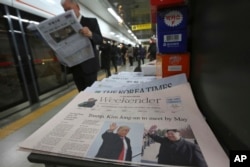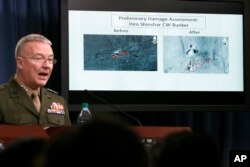The recent U.S. missile strikes against Syria could increase pressure on North Korea to give up its nuclear weapons, or reinforce in Pyongyang the need for nuclear deterrence.
The United States, France and Britain fired 105 missiles at three Syrian chemical weapons facilities on Saturday, in response to an alleged Syrian chemical weapons attack in the city of Douma that killed at least 40 people and wounded or sickened hundreds of others. The Syrian government has repeatedly denied any use of banned weapons.
The combined military strike on Syria comes as the administration of U.S. President Donald Trump and the government of North Korean leader Kim Jong Un are preparing for an expected summit in late May or early June to discuss dismantling the North’s nuclear program in exchange for security guarantees.
Maximum pressure
Trump’s willingness to use force against Syria can be seen to reinforce his “maximum pressure” campaign message, that in addition to imposing tough sanctions banning most North Korean exports, the U.S. would take military action, if necessary, to force Kim to terminate his nuclear program and end the continued development of a nuclear armed intercontinental ballistic missile that can reach the U.S. mainland.
Calling the U.S. attack on Syria “a warning for Pyongyang,” the South Korean newspaper the Korea Joongang Daily, in an editorial on Monday said, “If Kim wants to be free from the fear of a potential raid, then he must be willing to denuclearize.”
From this perspective the U.S. show of force in Syria will increase pressure on the leadership in North Korea to offer meaningful nuclear concessions at the Trump-Kim summit.
“Unless it abandons at least part of its nuclear and missile capabilities then the Trump administration will not be satisfied,” said Bong Young-shik, a political analyst with the Yonsei University Institute for North Korean Studies in Seoul
Nuclear deterrence
However the U.S. military strike on Syria could also reinforce concerns in North Korea that giving up its nuclear deterrent would make the country more vulnerable to a similar attack.
“If it thinks that its regime is not guaranteed, it will keep the nuclear program,” said Kim Hyun-wook, a professor of American studies at the Korea National Diplomatic Academy in Seoul.
North Korea has long justified the need for its nuclear program by pointing to the fate of Moammar Gadhafi in Libya, who was overthrown and killed by U.S. and NATO backed rebel forces, just a few years after he agreed to give up his country’s nuclear weapons.
The U.S. and its allies justified their military action in Libya as a “humanitarian intervention” to prevent government forces from slaughtering the civilian opposition. Without a nuclear deterrent, leaders in Pyongyang worry the U.S. could use a similar humanitarian justification to intervene in North Korea.
“The U.S. can view North Korea as a autocratic state or human rights violator, and then it can always overthrow the Kim Jong Un regime that does not have nuclear program,” said Professor Kim.
From this perspective, the Kim government could use the strike against Syria to emphasize its step-by-step approach to denuclearization to maintain stability, which would include the reduction or removal of U.S. forces in Korea over time as part of the required security guarantees.
Asia reaction
Major U.S. Asian allies Japan, South Korea and Australia voiced strong support for combined military action to punish Syria’s alleged use of chemical weapons and to deter other countries as well.
China, however, objected to the U.S. and its allies taking “unilateral military action” prior to an impartial investigation and without the consent of the U.N. Security Council, where Russia, a close ally of Syria, holds veto power.
Lee Yoon-jee in Seoul contributed to this report.









